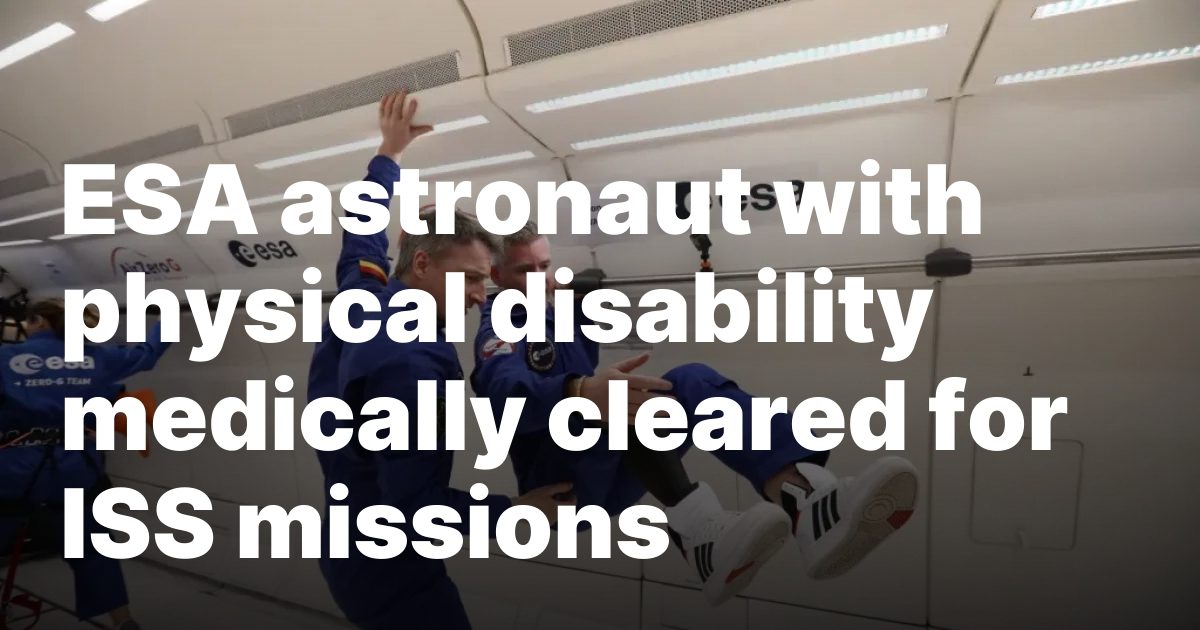
WASHINGTON — In a groundbreaking development, a European astronaut with a physical disability has received medical clearance for missions to the International Space Station (ISS).
On February 14, the European Space Agency (ESA) announced that John McFall, a reserve astronaut, has been certified by an international medical board for long-term missions aboard the ISS.
This certification is significant as McFall lost his right leg in a motorcycle accident at the age of 19 and currently uses a prosthesis. He is the first individual with such a physical disability to be approved for training related to ISS missions.
“Today, we are proud to announce that John has been certified as an astronaut eligible for long-duration missions to the International Space Station. This marks a remarkable advancement in our goal to enhance access to space for everyone,” stated Daniel Neuenschwander, ESA’s director of human and robotic exploration, during a press briefing.
McFall was selected as part of an astronaut class revealed in 2022, which included an initiative by ESA to identify a “parastronaut” capable of flying with physical disabilities.
Since his selection, McFall has engaged in a feasibility study named “Fly!” aimed at identifying any potential challenges that might hinder his ability to join ISS missions, with a focus on his health and the safety of space operations.
“We must not overlook the various safety protocols involved in operating on the International Space Station,” Neuenschwander emphasized. “I had some reservations about potential obstacles, but I am thrilled that we have successfully addressed them.”
“I feel incredibly proud,” McFall remarked. “The positive and warm reception from our international partners is a testament to the thorough and careful work we conducted during the feasibility study.”
The feasibility study evaluated over 80 aspects related to training, ISS and spacecraft operations, medical considerations, and crew support, according to Jerome Reineix, the Fly! study manager at ESA. Although he anticipated various technical obstacles, he noted that they could be overcome.
“The primary challenge we faced was not technological but rather related to perceptions,” Reineix explained. “People often have preconceived notions about the capabilities of individuals with physical disabilities, necessitating ongoing explanations and demonstrations.”
While McFall is now medically cleared for an ISS mission, ESA has not yet assigned him to a specific flight. “He is now an astronaut eligible to join any upcoming missions, similar to his peers. However, we cannot provide a timeline at this moment,” Neuenschwander stated.
McFall is among 12 reserve astronauts chosen in the 2022 class, serving part-time in ESA’s astronaut corps and being available for upcoming flight opportunities. Among them, Marcus Wandt recently completed a mission to the ISS on Axiom Space’s Ax-3 private astronaut flight. Another, Sławosz Uznański-Wiśniewski from Poland, is set to travel to the ISS this spring on the Ax-4 private mission.
Neuenschwander indicated that long-duration ISS missions would likely be undertaken by ESA’s full-time astronauts, five of whom were selected in 2022. “Our goal is to enable all of them to participate in long-duration missions before the ISS is retired,” he added, noting that the space station’s retirement is currently planned for around 2030.
McFall has also been associated with a prospective private astronaut mission being studied by the U.K. Space Agency, which is examining a memorandum of understanding with Axiom that was signed in October 2023. This mission could potentially be led by former ESA astronaut Tim Peake, who joined Axiom as a strategic adviser in July 2024.
During the briefing, McFall confirmed ongoing discussions between Axiom and the U.K. Space Agency. “It presents a very intriguing possibility,” he noted, adding that the agency has been proactive in ensuring readiness for any developments.
“It is remarkable to see that John and the ESA team have demonstrated the technical feasibility for individuals with disabilities, like John, to live and work on the International Space Station,” stated Liz Johns, interim head of space exploration at the U.K. Space Agency, emphasizing the agency’s support for the next steps of this initiative.
Neuenschwander reiterated that any decision regarding a private astronaut mission rests with the U.K. Space Agency. “Regardless of the mission framework or funding arrangements, we have now obtained clearance for John to participate, which is the most crucial takeaway,” he concluded.
Related









